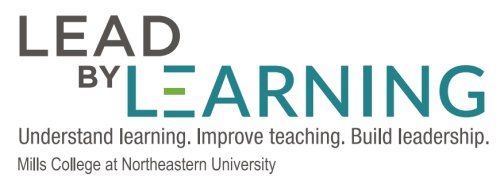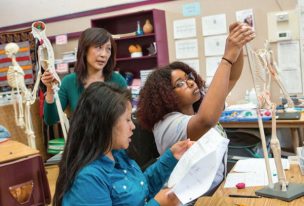How Can Leaders Leverage Teacher Inquiry for School-Wide Improvement?
 Throughout the year, as teacher scholars engage in Mills Teacher Scholars inquiry work, they deepen their understanding of specific learning goals for students and become more aware of how their students are approaching a specific area of learning. This knowledge builds as teachers collaborate with colleagues, analyze classroom-level data, and get feedback on changes they are making to their practice throughout the year.
Throughout the year, as teacher scholars engage in Mills Teacher Scholars inquiry work, they deepen their understanding of specific learning goals for students and become more aware of how their students are approaching a specific area of learning. This knowledge builds as teachers collaborate with colleagues, analyze classroom-level data, and get feedback on changes they are making to their practice throughout the year.
The transformative potential of teacher inquiry work, however, does not stop at the individual teacher level. Mills Teacher Scholars supports inquiry teams to leverage these individual learnings by asking teachers to consider how what they have learned might contribute to whole school improvement efforts. At year’s end, we invite teachers to make sense of their inquiry findings at a collective level, asking the entire group of teacher scholars at a site to weigh in on the implications of the inquiry learning for their school. Instructional leadership in this context moves beyond formal teacher leaders and the ILT and is distributed across the staff.
By listening to what teachers have learned through their inquiry and by inviting teachers to look for patterns and themes and to consider implications of their inquiry work, site leaders have the opportunity for the teacher inquiry to drive school-wide change.
The following are examples of themes that we hear frequently across school site groups:
The Need for Increased Alignment
As teachers discuss their inquiry learning, they recognize that there is work to be done to ensure consistency between and across grade levels.
“We realized we didn’t even know how second grade was teaching that!”
“If we could modify this rubric so it gets increasingly complex through the grades, our students would come to us so much prepared.”
“I’ve been teaching tech literacy skills such as online reading but haven’t talked to anybody else about that. We need a whole school scope and sequence for these skills.”
Modifications to Existing Curriculum
Often teachers come to understand that there are patterns emerging around strengths or weaknesses of a particular curriculum or program structure.
“We are noticing impressive growth through the SIPPS intervention in the early grades. We should discuss broadening this to other grades.”
“It’s become clear that our CCSS math program doesn’t even address____________”
“If we are all saying that we value_______, we need to make time for it.”
Professional Learning Needs
Teacher scholars develop a questioning stance towards their practice and a dedication to continued professional growth, which often leads to demands for ongoing professional learning in a specific area.
“We realized that as a staff we need to further explore how race and gender intersect with academic discussion.”
“We are each figuring out how to teach Guided Reading in our own way. We need PD specifically around this so we can have consistency.”
“Many of us articulated that we are struggling to meet the needs of our newcomer students. We want concrete strategies for supporting them.”
The challenge to school leaders is to actualize the collective ideas and suggestions, providing the dedicated focus, time, resources and structures for the deep work of school improvement to occur in the year to come. Instead of solely making plans based on district-level mandates, skilled administrators can use the emerging patterns from their teachers’ inquiry work to drive school change.

